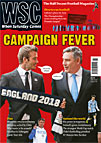 Owning your country's biggest club is a sure-fire way to boost public profile, or even become president. Simon Cotterill explains
Owning your country's biggest club is a sure-fire way to boost public profile, or even become president. Simon Cotterill explains
For all the allegations, infidelity and plastic surgery, the most surprising aspect of Silvio Berlusconi’s time as Italy’s prime minister is his ownership of AC Milan. It’s not surprising that he finds the time – the mystery is why the fans of Inter, Juventus and all other rival teams don’t form a significant political resistance. Were a Premier League chairman to run in an election, most rival club fans would surely put political preferences aside and vote against him.
There are few UK club owners or chairmen who could even rely on their own club’s fans to vote for them. But when Berlusconi was first elected prime minister in 1994 and also during his victory of 2001, his prominence as owner of one of Italy’s biggest clubs was considered a major factor. This year, Chile’s new president Sebastián Piñera has again proved that football fame can contribute to political success.
Sixty-year-old Piñera is one of Chile’s richest men. A Harvard-educated economist, he made his fortune introducing credit cards to Chile in the late 1970s and purchased significant stock in TV stations, power companies, Chile’s national airline (LAN) and, most publicly, in Colo-Colo, Chile’s most popular team.
Last year, the right-wing opposition to Chile’s last president Michelle Bachelet chose Piñera as their candidate to become her successor. When he won this January’s final voting round, after investing over £10 million of his own money in the election campaign, Piñera became Chile’s first democratically elected right-wing leader since 1958.
Chile’s conservatives are of course tainted by the rule of General Pinochet and fears that figures from that era would return to government were raised by Piñera’s left-wing opponents. Piñera, however, distanced himself from Pinochet and wooed voters by portraying himself as a hard-working entrepreneur who, as a football fan and owner of Chile’s most successful club, understood the people.
Colo-Colo are based in Santiago, home to over a third of Chile’s electorate. They’ve won the league more times than any other team and are the only Chilean side to have won the Copa Libertadores. On March 11, when Sebastián Piñera was inaugurated as Chile’s new president, they were the country’s reigning champions. Colo-Colo are frequently derided by Los de Abajo, the once left-leaning ultra fans of main rivals Universidad de Chile, for having had Pinochet as their honorary president. Crucially for Piñera, however, they draw their vast fan base from all spectrums of Chilean society.
AC Milan were league title holders when Berlusconi was first elected in Italy and, like his Italian counterpart, Piñera controls a leading television station (Chilevision). Since coming to power Piñera has found the Berlusconi comparisons harder and harder to shake. He hasn’t severed his ties to Colo-Colo or Chilevision. Despite his inauguration coming a few days after Chile’s devastating earthquake, the recent surge in the value of Piñera’s stocks and shares has been almost equally prominent in the media. He’s already struggling to convince many that he will really put the country’s interests first. An opposition congresswoman remarked: “He must have known his stocks would rise when he was elected… because he’s a man who knows the financial markets.”
Many Chileans were relieved when Piñera named a balanced cabinet, free of Pinochet connections and including independent politicians and a member of the opposition party. But eyebrows have been raised by his appointment of Gabriel Ruiz-Tagle as minister for sports. Ruiz-Tagle stepped down as Colo-Colo president to take the role and remains chairman of the club’s parent company. While Piñera now plays down his club connections, the new sports minister has publicly and repeatedly said he will retain his club shares: “The law doesn’t forbid me. Moreover, Colo-Colo is everything to me. My shares in Colo-Colo are my most treasured possessions. It’s like a son, and someday I expect to return to its administration.”
When Piñera’s company took over Colo-Colo were at a low ebb, having recently been declared bankrupt. Chile’s new president and sports minister reinstalled them as the country’s wealthiest and most powerful sports club and, according to Ruiz-Tagle, “the idea is to transmit this experience to Chilean society”. Going from successfully running a football club to successfully running a country is a big leap. Having convinced voters it’s one he is capable of, Sebastián Piñera now has to prove it.
From WSC 279 May 2010